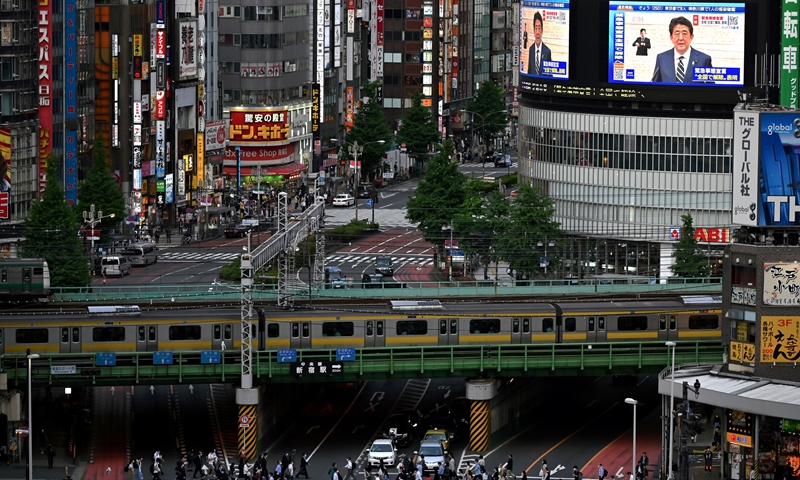Tokyo to enter "2nd phase" of eased virus-linked restrictions despite uptick in COVID-19 cases
Source:Xinhua Published: 2020/5/30 1:08:13

Japanese Prime Minister Shinzo Abe (top right) is seen on a live TV broadcast in Tokyo’s Shinjuku area on Monday. He lifted the state of emergency imposed nationally to combat the coronavirus following a sharp decline in the number of new cases (See story on Page 17). Photo: AFP
The second phase of Tokyo easing its coronavirus-linked business activities will begin on Monday, Tokyo Governor Yuriko Koike said Friday, despite a recent uptick in COVID-19 cases in the capital.
"I want the operators of those facilities to take thorough measures to prevent the spread of infection using this weekend," Koike told a press conference on the matter.
She said that initial plans for the capital were for the second phase to be entered on Saturday, but the schedule has been pushed back to Monday to give businesses more time to implement anti-virus measures over the weekend, before reopening.
The businesses that will be allowed to reopen as the capital enters phase two, include cinemas, sports gyms, cram schools and retail stores other than those selling daily necessities.
In the second phase, as with the first, restaurants and bars will still be requested to not serve alcohol after 10:00 p.m. local time.
On Monday, Japanese Prime Minister Shinzo Abe completely lifted the state of emergency for the nation, with the five remaining prefectures still under restrictions, including Tokyo, being judged to have also controlled the spread of the virus.
According to the latest figures from the health ministry and local authorities Thursday evening, however, 22 new COVID-19 infections were reported in Tokyo, rising from 15 cases recorded a day earlier.
Prior to the state of emergency being lifted, the capital had seen the daily infection rate drop to as low as two.
Despite the rising cases in the capital, Koike doubled-down on the decision to further ease restrictions, saying Tokyo's capacity to provide medical care is sufficient as the number of those with severe virus symptoms and those being treated in hospitals has declined.
Posted in: ASIA-PACIFIC,WORLD FOCUS